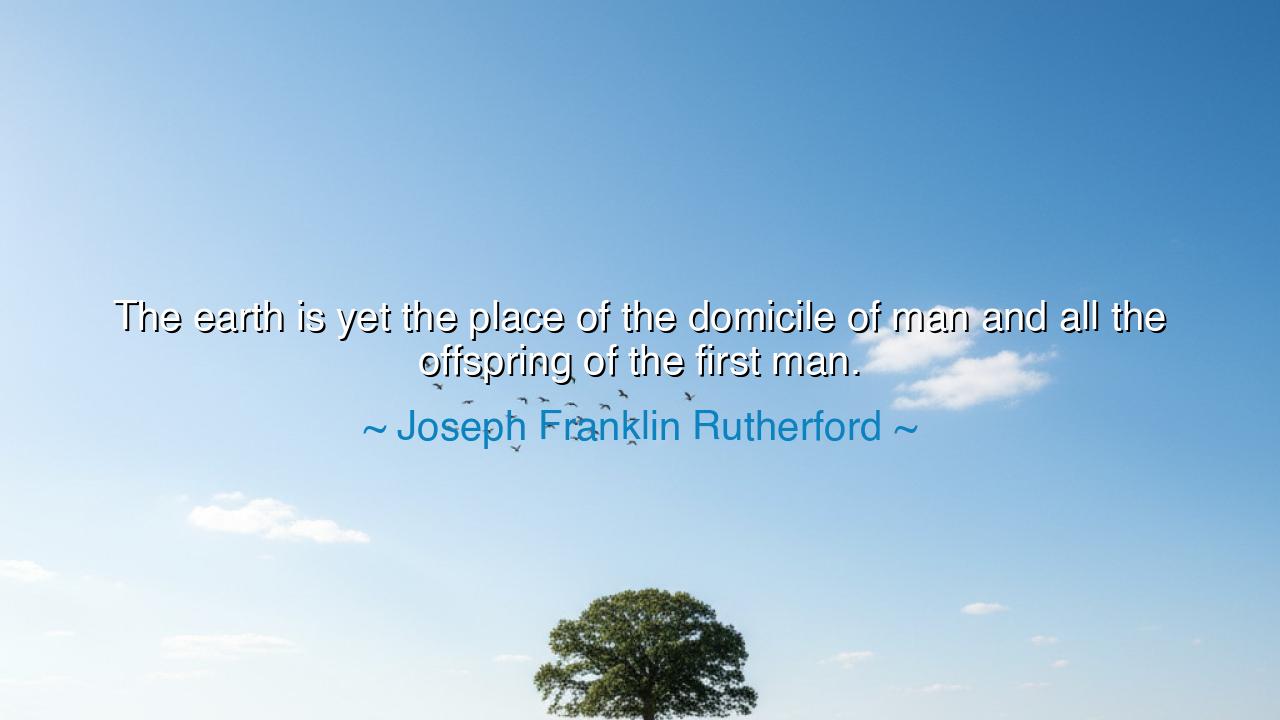
The earth is yet the place of the domicile of man and all the
The earth is yet the place of the domicile of man and all the offspring of the first man.






Joseph Franklin Rutherford, the bold voice of the early Watch Tower movement, once proclaimed: “The earth is yet the place of the domicile of man and all the offspring of the first man.” In this statement we hear not the musings of a philosopher detached from life, but the conviction of one who believed in the eternal bond between humanity and the ground from which it was formed. It is a reminder both humbling and ennobling: that no matter how high man builds his towers, no matter how far he casts his eyes to the heavens, his true dwelling is still upon the earth, the cradle that has sustained him since the days of Adam.
The origin of these words lies in Rutherford’s teachings on creation and destiny. In his theology, the earth was not a temporary exile, to be abandoned for some distant paradise, but the rightful home of humankind, entrusted to us from the beginning. To say it is the “domicile” is to affirm that it is not merely a staging ground for survival, but a sacred household where generations of the offspring of the first man live, labor, and pass on their inheritance. In his voice resounds the ancient belief that the world is not to be despised but to be honored, not to be escaped but to be cultivated.
History, too, bears witness to this truth. Recall the story of the Israelites entering the Promised Land. To them, the soil was not just dirt beneath their feet, but a gift — “a land flowing with milk and honey.” Their law was filled with instructions to care for the land, to let it rest in sabbath years, to respect its bounty. They understood, as Rutherford later taught, that the earth is the household of humanity, and that to neglect or exploit it is to dishonor the covenant between man and his Maker.
We see the same lesson in the life of Mahatma Gandhi, who urged his people to return to the simplicity of the soil, to spinning wheels and village life. He believed that man’s strength was rooted not in great industrial machines, but in his harmony with the earth. In this way, Gandhi echoed the wisdom of Rutherford’s words: that despite all the changes of history, the true domicile of man remains in the earth beneath his feet, and that estrangement from it brings corruption, while harmony with it brings peace.
The lesson is profound: though we dream of the stars, though we invent machines to fly through the heavens, we must never forget that our life is bound to the earth. The air we breathe, the water we drink, the food we eat — all are gifts of this sacred home. We are not strangers passing through; we are sons and daughters, rooted in its soil, dependent upon its mercy. And just as a household must be cared for, so too must we care for the earth, for it shelters not only us but all the offspring of the first man — our children, and their children yet unborn.
What then shall we practice? Let us live with reverence toward the land. Let us protect the waters, tend the fields, and guard the forests, knowing they are not only resources but the very fabric of our dwelling place. Let us teach our children that to despise the earth is to despise their own inheritance, and to honor it is to honor the Creator and the generations before them. And let us remember that our progress as a people is not measured by how far we escape the earth, but by how well we preserve it as the domicile of all.
Therefore, O children of time, hear Rutherford’s cry: “The earth is yet the place of the domicile of man and all the offspring of the first man.” It is the truth of beginnings and the truth of endings. Guard your home. Cherish the soil. Walk humbly upon it, for it bore your fathers and will bear your sons. And in that remembrance, live not as exiles, but as stewards, entrusted with a sacred household whose walls are mountains, whose floor is meadows, whose roof is the infinite sky.






AAdministratorAdministrator
Welcome, honored guests. Please leave a comment, we will respond soon